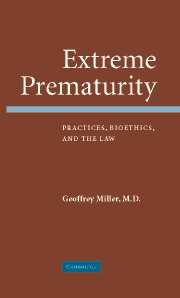Book contents
- Frontmatter
- Contents
- Part 1 THE EXTREMELY PRETERM INFANT: EPIDEMIOLOGY, PERCEPTIONS, AND PRACTICES
- 1 Introduction
- 2 Historical Aspects
- 3 Survival
- 4 Influence of Obstetric Management
- 5 Effect of Resuscitation in the Delivery Room
- 6 National Comparisons
- 7 Prediction of Outcome
- 8 Limit of Viability
- 9 Morbidity
- 10 School Age Outcome
- 11 Adolescence
- 12 Perceptions and Practices
- 13 Resource Expenditure
- Part 2 BIOETHICS
- Part 3 REPORTS, OFFICIAL OPINIONS, AND GUIDELINES
- Part 4 THE LAW
- Part 5 EPILOGUE: TRUTH, TRUST, AND BOUNDARIES
- References
- Index
10 - School Age Outcome
Published online by Cambridge University Press: 23 September 2009
- Frontmatter
- Contents
- Part 1 THE EXTREMELY PRETERM INFANT: EPIDEMIOLOGY, PERCEPTIONS, AND PRACTICES
- 1 Introduction
- 2 Historical Aspects
- 3 Survival
- 4 Influence of Obstetric Management
- 5 Effect of Resuscitation in the Delivery Room
- 6 National Comparisons
- 7 Prediction of Outcome
- 8 Limit of Viability
- 9 Morbidity
- 10 School Age Outcome
- 11 Adolescence
- 12 Perceptions and Practices
- 13 Resource Expenditure
- Part 2 BIOETHICS
- Part 3 REPORTS, OFFICIAL OPINIONS, AND GUIDELINES
- Part 4 THE LAW
- Part 5 EPILOGUE: TRUTH, TRUST, AND BOUNDARIES
- References
- Index
Summary
There have been several reports of follow-up to school age, as well as into adolescence, which show some variability in their results for the reasons previously stated. Although major disability does not occur in the majority of survivors, when they reach school age, a high percentage appear to experience functional impairments, including disorders of higher mental function, that affect education and behavior.(78, 90, 107–109) Psychosocial and socioeconomic factors may also play a role in these outcomes.(78) The Victorian Infant collaborative study from Australia(90) reported that the IQ of their extremely preterm study group (gestation less than 28 weeks, birth weight less than 1,000g) was within the normal range but averaged about 9 points less than abnormal birth weight control group. In the preterm group, poorer scores were found in verbal comprehension, perceptual organization, freedom from distractibility, and processing speed. The infants were born in 1991 and 1992, and although they have lower mean test scores than normal birth weight controls in reading, spelling, and arithmetic, these scores were much improved when compared to earlier previous reports. Saigal and colleagues, from Canada,(110) reported on the outcomes of ELBW infants at 5.5 years. Their findings were that 9.5% had cerebral palsy, 4.8% were blind, and 20% had mental retardation. Using the Vineland Adaptive Behaviour Scales they found that approximately 8% were significantly functionally disabled (composite score more than 2 standard deviations below the mean). Areas of limitation included motor skills, activities of daily living, communication, and socialization.
- Type
- Chapter
- Information
- Extreme PrematurityPractices, Bioethics and the Law, pp. 29 - 31Publisher: Cambridge University PressPrint publication year: 2006



